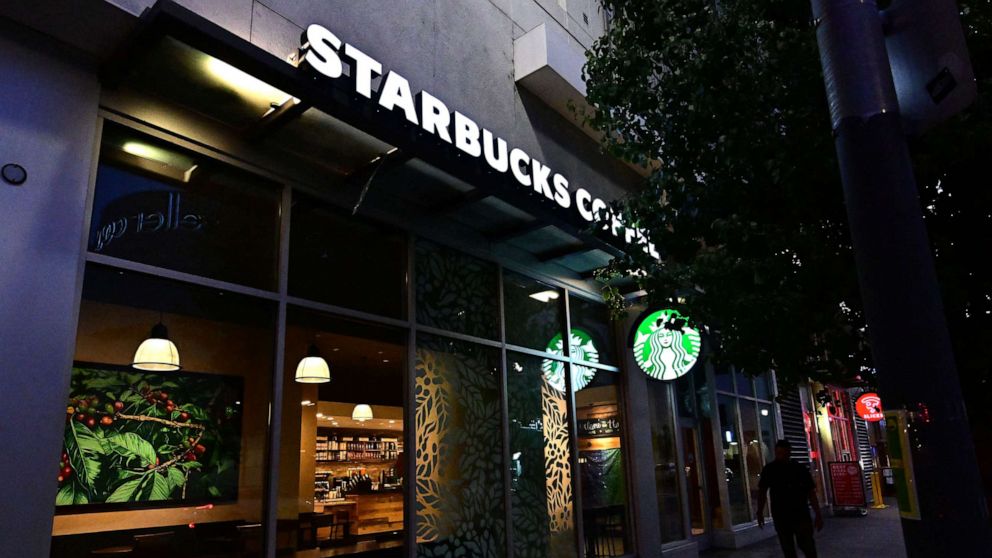
Starbucks is sharing the decision-making process behind its recent announcement that it would be closing 16 of its nearly 16,000 locations in five major U.S. cities by the end of the month.
The company announced on Monday that it would be shuttering six locations in Seattle and six in Los Angeles, as well as two stores in Portland, Oregon, citing safety concerns. One store in Washington, D.C., and another in Philadelphia are also impacted by the closures.
A spokesperson for the Seattle-based coffee chain confirmed to ABC News on Friday that the decision to close the stores was "a product of conversations over the last 10 months."
Earlier this week, Debbie Stroud and Denise Nelson, senior vice presidents of Starbucks' U.S. operations, sent an open letter to Starbucks employees stating, "We read every incident report you file -- it's a lot. We want you to know that creating a safe, welcoming, and kind third place is our top priority. Because simply put, we cannot serve as partners if we don't first feel safe at work."
The term third space -- a location that serves communities outside of work or home where people can gather -- has been used to describe Starbucks coffee shops by both the company and its customers.
Speaking to ABC News on Friday, the company spokesperson declined to detail specific incidents or a specific number of incidents that acted as catalysts for the decision, but said that "what it comes down to, these are things that [businesses] across the country are dealing with."
"It's issues related to chronic homelessness, through substance abuse, to [the] mental health crisis to social and economic upheaval following the the start of the COVID-19 pandemic -- it's all of these things," they said.
They added that, as a nationwide chain, "we have a unique window into neighborhoods in particular."
According to Stroud and Nelson's letter -- which asked, "How do we continue to show up for our communities while protecting our partners?" -- Starbucks plans to evaluate its Third Place Policy to help train partners on addressing disruptive behaviors and engaging local community resources.
One way the company has already started to address issues brought on by the pandemic, according to the spokesperson, has been to "increase ... minimum staffing levels to ensure that they have the ability to serve customers, to de-escalate and provide first aid or all these other things that Starbucks is beefing its training up on."
The total number of hours of training required for new partners has doubled from 20 to 40 hours, covering everything from actual coffee training to de-escalation. Starbucks plans to revisit the frequency of these trainings for existing partners next month as well.
In Monday's letter, Starbucks said it would continue to evaluate modifying operations to align with its new safety goals, including closing bathrooms or closing stores altogether if it could not promise a safe environment for customers and employees.
Starbucks also recently announced its outreach worker program which seeks to embed social workers in stores with high level challenges. The program is in the process of being stood up in eight cities, including some of the locations affected by the new closures.
The company spokesperson on Friday also responded to recent backlash over the fact that two of the 16 stores impacted by closures are unionized.
"Any claims of union busting are false. We regularly open and close stores as a standard part of our business operations," the spokesperson told ABC News. "We apply the same focus on safety at unionized and non-union stores and are closing non-union stores where we are similarly challenged in providing a safe environment for our customer and partner experience."
Additionally, they said leaders have worked "with humility, deep care and urgency to create the kind of store environment that partners and customers expect of Starbucks, and to maintain standards of partner care in this transition."
The company "will communicate with Workers United to discuss the impact of this decision on partners, including the opportunities for transfers to other stores," they said.
Below is the full list, which Starbucks confirmed to ABC News, of the local stores that will be closed by the end of July:
California: Los Angeles and 1st Street (Doubletree); 2nd and San Pedro Street; Hollywood Boulevard and Vine Avenue; Hollywood Boulevard and Western Avenue; Moss Avenue and Ocean Front Walk; Santa Monica Boulevard and Westmount Drive.
Oregon: Gateway Shopping Center; 4th and Morrison Street.
Pennsylvania: 10th and Chestnut Street.
Washington 23rd and Jackson Street; 505 Union Station; East Olive Way; Highway 99 and Airport Road - Everett; Roosevelt Square; Westlake Center.
District of Columbia: Union Station Train Concourse.